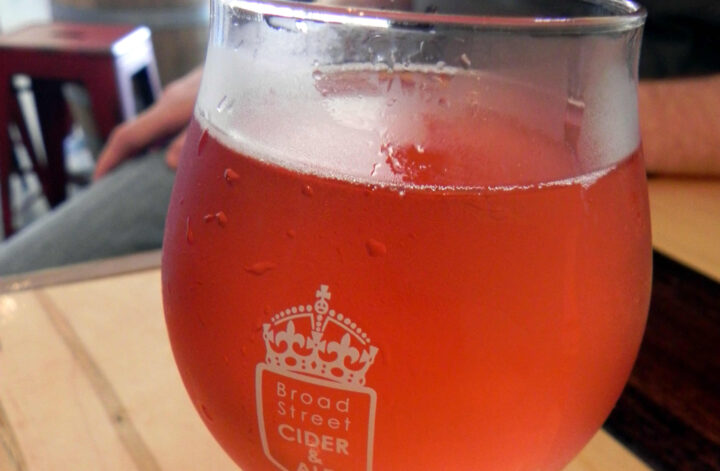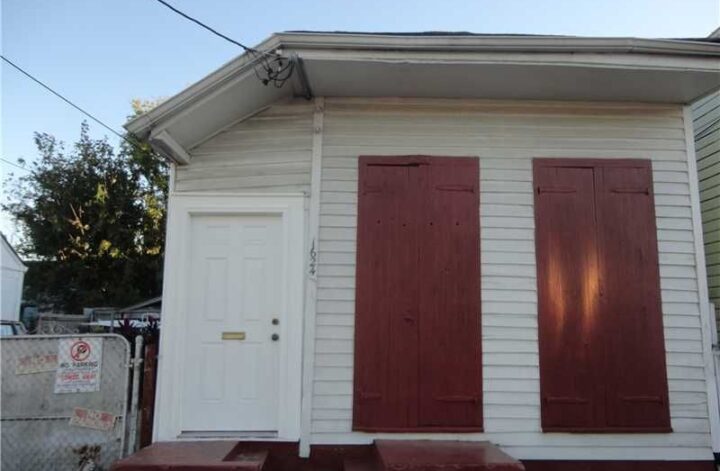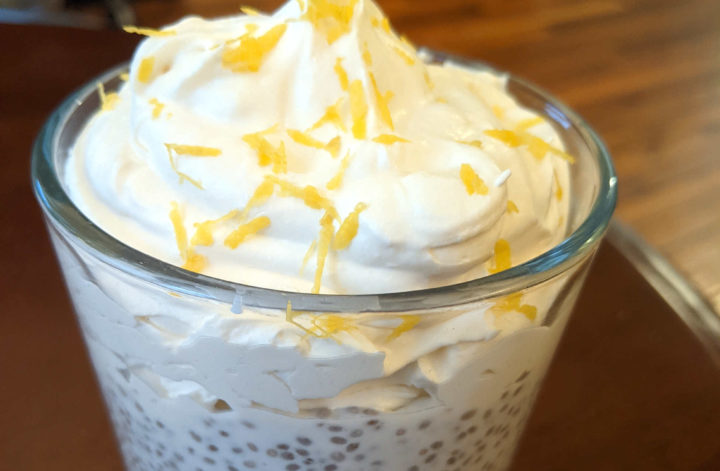Pursuing a PhD in history may not be the usual path to opening a cidery, but fortunately for Jonathan Moore and his wife Diana Powell, it was a path that was also strewn in craft beer and cider. In 2010, Moore moved to New Orleans after being accepted to the PhD program at Tulane University. While researching his doctorate, Moore traveled with Powell to the United Kingdom, Australia and New Zealand (among other destinations) where they not only furthered their love of craft beer, they also developed a taste for hard cider. “We wanted to stay here and I have a few skills, but I don’t do well in office jobs,” Moore admitted with a laugh. “The cidery came about when we decided to make our own jobs.”
Moore had already been home-brewing for several years, but he made the transition from beer to cider-making in New Orleans. Not only is it less labor-intensive, it’s not as temperature-dependent, nor does it need as much quality water to make a great batch of cider. “The juice is more expensive than grain, but it’s a lot less time consuming” says Moore. “My fermenting day … what takes every 8 hours of brewing, takes me about an hour of making cider.” In addition to learning the fermentation process on his own, Moore took a week-long cider-making and cider-startup course at Oregon State University a year before opening Broad Street Cider & Ale in Central City.
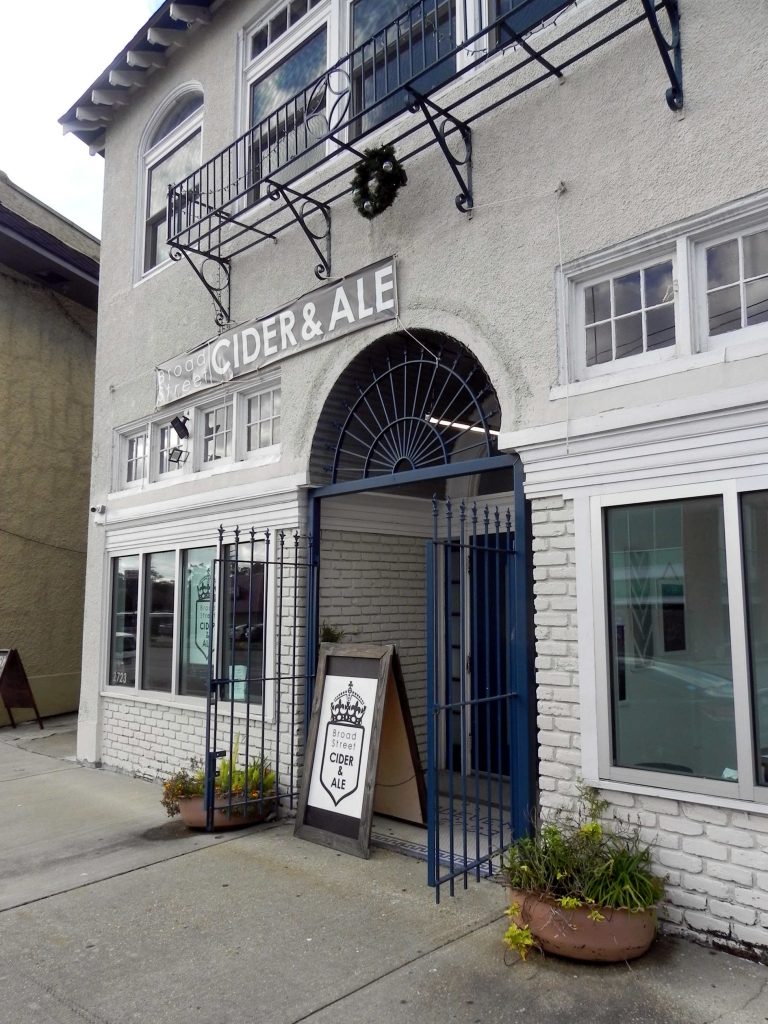
When Moore opened his cidery almost three years ago, there was something of a micro-brewing boom happening in the city. Places like The Courtyard, Port Orleans, Parleaux and Brieux Carre started popping up all over town and quickly gaining in popularity. With this jump, Moore and Powell saw a niche opportunity for a cidery to thrive. “Craft cider is in its baby-steps right now,” says Moore. “The nice thing about being in New Orleans is we’re the furthest cidery from the second-furthest cidery in the Continental United States, and we’re really setting the margins.”
On a federal level, a cidery is classified as a bonded winery, but in the state of Louisiana, Broad Street Cider & Ale is considered a micro-distillery. “Since we’re dealing in juice, we already have simple sugars, so we don’t have to break them down or anything like that.” says Moore. Most of their Macintosh apple juice is sourced from a family-run farm in Michigan, but they also occasionally use pear, blueberry and cherry juices, too. Since creating new and interesting flavor profiles is pretty much what craft brewing is all about, Moore likes to experiment with different ingredients and that includes what type of yeast he uses to start the process, like ale yeast and wine or champagne-based yeasts.
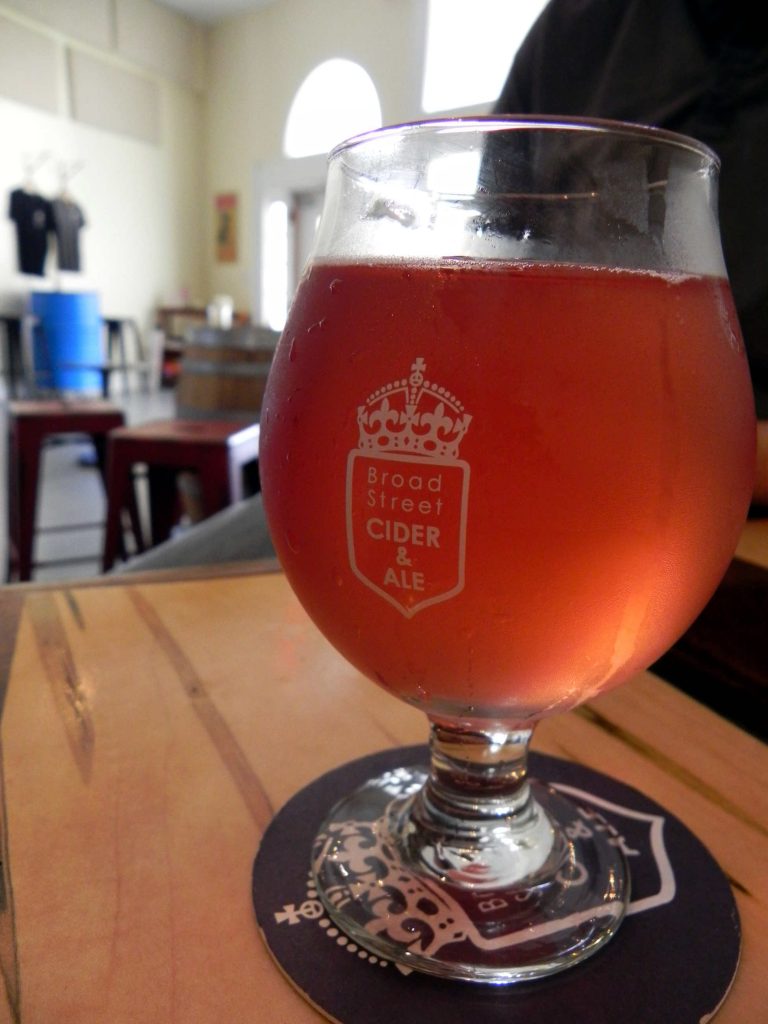
Towards the end of the two-week, primary fermentation process, non-fermentable ingredients – like tea, hops and spent botanicals — are added for the last two days. “We’ll put it in there in order to extract all the flavors, but any longer than that and we’ll get tannins and pull in a lot of ‘off’ flavors,” explains Moore. He’s able to purchase ingredients like spent gin botanicals (juniper, bay leaf and citrus) from nearby distiller Atelier Vie and other botanicals like yarrow and wormwood from their neighbor Roulaison Distilling. “We have a cider that’s called ’35 Steps to Roulaison’ because it’s literally 35 steps door to door,” says Moore. Afterwards, the cider is “racked off” into five-gallon Corny kegs and left to naturally carbonate over another 4-8 weeks.
Though Broad Street Cider does source some of their ingredients locally, they’ve only collaborated with Marigny micro-brewer Brieux Carré. “We tried to do a hazy cider,” says Moore. “It’s called ‘No Experience’ because neither of us had any experience … I had no experience with hazy stuff and he had no experience with cider.” They do plan to try again and Moore idly pondered that the new batch will be called “A Little Bit of Experience.”
While researching his PhD, Moore studied the history of bureaucracy, something that likely helped him quite a lot when pulling together the licensing and permits required to open Broad Street Cider & Ale, but he had outside help as well. Moore hired former general counsel for the Louisiana Office of Alcohol and Tobacco Control Jessica C. Starns and local architect Gary Krasnow to help move things along. “Thankfully, we had all of the pieces and parts to get through the myriad of different permits,” says Moore. “We had a good team.” The lease for the Central City space was signed on December 1st, 2017, everything was finalized on June 1st, 2017 and they were finally able to open on July 15th, 2017, only six weeks behind schedule.
When weighing the obstacles, opening a cidery seems quite a bit simpler than opening a micro-brewery. First, because they are heating things up and storing brews in large pressurized tanks, there are hoops craft brewers have to jump through to satisfy the local fire marshal. “All of these things can potentially explode” explained Moore. Also, because fermenting cider requires less equipment, the build-out costs were much more affordable than a brewery.

On the flip side, New Orleans is thousands of miles from quality apple juice suppliers, making delivery all the way from Michigan a tricky and expensive business. Good cider requires fresh juice without preservatives, otherwise the added yeast won’t activate and the juice will not ferment. “Right now [winter], I’m fermenting like a mad man just so I won’t need to have juice shipped to us in June, July and August when the weather is absolute garbage,” says Moore. “I’m producing more now since the weather is more temperate, because I know our product [juice] won’t be as beat up when it gets to us.”
Though it’s taken a little time for Moore to build up the cidery’s offerings, they’re currently in a good place inventory-wise. He usually has one to six five-gallon barrels fermenting in primary and approximately 120 in secondary. “Most of the ciders get better as they sit,” says Moore. “We’re getting to a point where the cider we’re pouring in January may have been in primary back in October or September and what I am making now won’t see the light of day until after Mardi Gras, if not Easter.” Rotating ciders have included absinthe-flavored Green Fairy, masala-spiced Chai Viscount, A Blue Night in Marrakech with blueberry and mint, Blush Jubilee with Montmorency tart cherry and Coffee Viscount with coffee and chicory.
One thing Moore doesn’t have to worry about, specifically in New Orleans, is sharing his customer base with local craft breweries. “They [craft breweries] are about 80% men whereas we are about 70% women,” says Moore. “The gender divide here is stark. In most other places the divide isn’t as obvious, but it works for us.” With women and couples as customers, Moore and Powell have easily adjusted their programming, aesthetics and tastes to match. “It is not how we thought it would all fall together, but we’re happy with how it has.” Along with movie nights and board games, the Central City cidery also features trivia where customers can win prizes like a box of candies from their neighbors Piety & Desire Chocolates to a tour of rum distillers Roulaison. Since its opening, Broad Street Cider & Ale has gained quite a following. Many people in the area had never tasted craft cider before and are both surprised and intrigued by the cidery’s product. “Most people have tasted the sugary swill from the grocery store,” says Moore. “So we’re really able to dictate what will appeal to people’s taste buds here, which is nice.”
***During the pandemic and state-wide stay-at-home order, Broad Street Cider is inviting locals to join the Cider Monthly Club – “It’s like a wine club, but with cider & mead.” For $45 per month, fans can get four fills per month. To sign up or for more info, feel free to email jon@broadstreetcider.com. But joining the club isn’t the only way, cider-lovers can also send an email to Jon specifying what flavor you desire and an email address for weekly, Friday afternoon pickups, from 1:00pm to 3:00pm.
